‘A Desire to Constantly Learn’
Tsh Oxenreider Talks Teaching, Traveling, and the Transformative Power of Habits
I first met
when my team at Thomas Nelson published her memoir Notes from a Blue Bike. I left for different opportunities around that time but continued bumping into Tsh online. It’s been fun following her career. She’s written several other books since then, including another memoir about traveling through thirty countries with three kids under ten, At Home in the World, and two reflections on liturgical seasons, Shadow and Light and Bitter and Sweet.Tsh writes her popular Substack newsletter
and co-hosts the podcast A Drink With a Friend. She also teaches high-school literature and leads tours around the world.Miller: When I think of you, I always have two images in mind: the traveler and the teacher. How did those two occupations come together for you?
Oxenreider: I first traveled overseas in the early nineties when I was a sophomore in high school, to Latvia and Russia, of all places. The Iron Curtain had just fallen and I was face-to-face for the first time with people who lived both wildly different lives from me, thanks to their culture, but also similar lives to mine, thanks to our shared humanity. Since then, I’ve had an insatiable desire to explore the world’s cultures, and I doubt it’ll ever be fully slaked (though the older I get, the more I appreciate what it means to be at home). As a pilgrimage guide, I love walking alongside fellow travelers and pointing out the beauty of various places, and how they point to the sacramental nature of life.
I initially began teaching as a response to a need in my kids’ school (which was officially a highly structured homeschool co-op), but I soon found it was a job I was both skilled at and truly enjoyed. It provided some needed structure in my work week (as a self-employed writer), a way to connect with and serve my local community (as someone whose work is largely online), and an excuse to rekindle my love of great books. Six years later, I find teaching adolescents keeps me more active and engaged in the world around me, and it makes me a better writer, even though I initially suspected it would take away writing energy and time.
Wearing both these hats comes from the same place, now that I think of it: a desire to constantly learn.
“It’s not about how quickly you read, nor even how many books you read (so long as you’re constantly reading something), it's about a willingness to learn from others.”
—Tsh Oxenreider
The adventure of travel is intuitively obvious to most of us, but that’s maybe not always true for literature. How would you communicate the adventure of books to your students—to all of us?
I think of the quote attributed to St. Augustine: “The world is a book, and those who do not travel read only a page,” and how I believe the converse is true as well: the book is a world, and those who do not widely read do not leave their home. Books are an invitation to leave your world and step into someone else’s, giving the reader both potential entertainment and potential education. It’s not about how quickly you read, nor even how many books you read (so long as you’re constantly reading something), it’s about a willingness to learn from others. How else could you travel in the present day to a remote Atlantic Ocean island in the seventeenth century than by reading Robinson Crusoe?
And speaking of older classics, the only way those of us still alive can learn from those long-dead is through their words housed in books—it’s the most accessible way we can learn the traditions upon which we stand. As G.K. Chesterton says, “Tradition is the democracy of the dead. It means giving a vote to the most obscure of all classes: our ancestors.” Reading old books gives a vote to our ancestors.
I’m intrigued by a picture you posted some time ago of nine authors you were teaching. I recognized six of them. It’s a delightfully diverse array. Could you tell us about them, what you see in them as a teacher, and how you bring them into conversation with each other with your students?
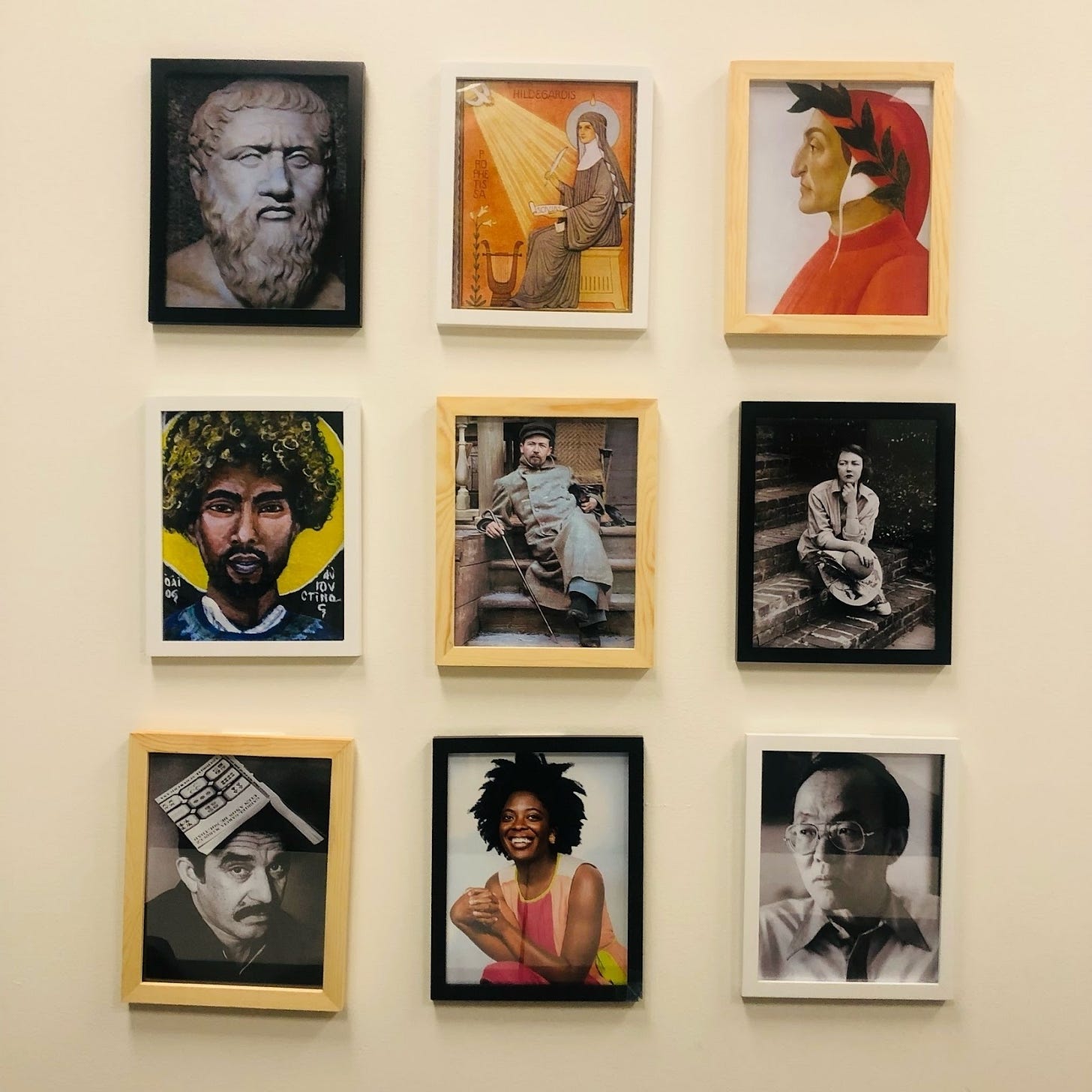
I believe that was the year I began the year with Ecclesiastes by King Solomon, then moved on to excerpts from Plato’s Republic, Dante’s Inferno, St. Augustine’s Confessions, and selections from Hildegard von Bingen, Pascal, Tolstoy, and the like, eventually ending the year with Flannery O’Connor’s short stories, Yaa Gyasi’s Homegoing and Shusaku Endo’s Silence. Wildly diverse, indeed!
Choosing what we’ll read is one of the hardest parts of the job of teaching literature to adolescents. You can’t possibly teach all, or even most, that’s good and ennobling to read. So, at their age, I lean towards a sweeping overview that touches on common themes. This particular year’s focus was on world literature (as opposed to strictly American, for example), with the themes of searching for meaning and belonging.
All my classes lean heavily on Socratic discussion because I find that’s the best way to drink deeply from great books—it’s an invitation to participate in the Great Conversation. I never begin a discussion asking, “So, what did you think?” because adolescents (and all of us, really) need to learn to separate their personal opinions from what a great book has to teach us. At the beginning of class, I usually ask them to write down their discussion questions and thoughts on an index card, dividing their thoughts as evenly as possible between context, construct, and content. Providing food and drink for our class discussions also often helps, especially when the book is particularly challenging. Shameless bribery, perhaps, but I stand by it.
“The book is a world, and those who do not widely read do not leave their home.”
—Tsh Oxenreider
What are your favorite books to teach?
It depends on the age of the students, but when they’re older (juniors and seniors in high school), I love teaching George Orwell’s 1984, Charlotte Bronte’s Jane Eyre, and Dostoevsky’s Crime and Punishment. They’re fodder for some great conversations at their ages, particularly about how we know what’s true and how to live well because of it.
You’ve written about prudence as the queen of virtues and how to cultivate it. Describe what you mean and share how literature can help us develop it?
To be honest, it wasn’t me who called prudence the queen of all virtues; it was many, many other smart people who labeled it as such, and who am I to argue with such wisdom? Prudence is “right reason in action,” so it’s the queen because it guides all other human actions. Cultivating the virtue of fortitude (or courage), for example, requires prudence because to stand firm in difficult situations requires the ability to take action according to true things. Prudence is an active virtue; we don’t just think (reason) correctly, we take action based on correct thinking.
The only real way to cultivate any virtue is to practice it enough until it becomes a habit (smart people, like St. Thomas Aquinas, argue that this is our universal life’s purpose: to cultivate a habit of virtue). Habits aren’t habits until we do them automatically, again and again and again. This isn’t easy for any of us. But we’re helped along the way with wisdom and examples from others, and books are just about the best teacher and guide in our life’s pursuit of cultivating virtue. We humans are hard-wired to learn best from stories.
“Books are just about the best teacher and guide in our life’s pursuit of cultivating virtue.”
—Tsh Oxenreider
Think of Jane Eyre: She had to make a hard choice (I won't spoil it for those who will still have the pleasure of reading it for the first time). If she went with her emotional desires, she’d choose Option A, but she went with Option B because deeper than her basest desires was her conviction to live according to true love which transcends feelings or emotions—that is to say, true love that is “willing the good of another.” Jane chose Option B because she was deeply prudent. What a transcendent example for all of us to live accordingly in our own modern lives.
Along with teaching, you’re a travel guide. How do you select the cities and sites you choose?
This is almost as hard as choosing which books to teach! I choose locations based on both idealism and practicality. Where's a location many of us have on our bucket lists? And how feasible is it to get there? A pilgrimage is more than just a trip, it’s a sacramental act of immersion in a particular place to better learn about God and ourselves. This means the places I choose are rich in history and beauty, though that beauty comes in all sorts of forms: architecture, cuisine, topography, and more.
Since I’m leading the group, I also prefer to have some personal connection to the place if I can help it (at minimum, I prefer to have gone there myself at least once). So far I’ve led groups through London and the surrounding areas, the Tuscan region of Italy, and Southern Ireland. Plenty more locations are coming in the future!
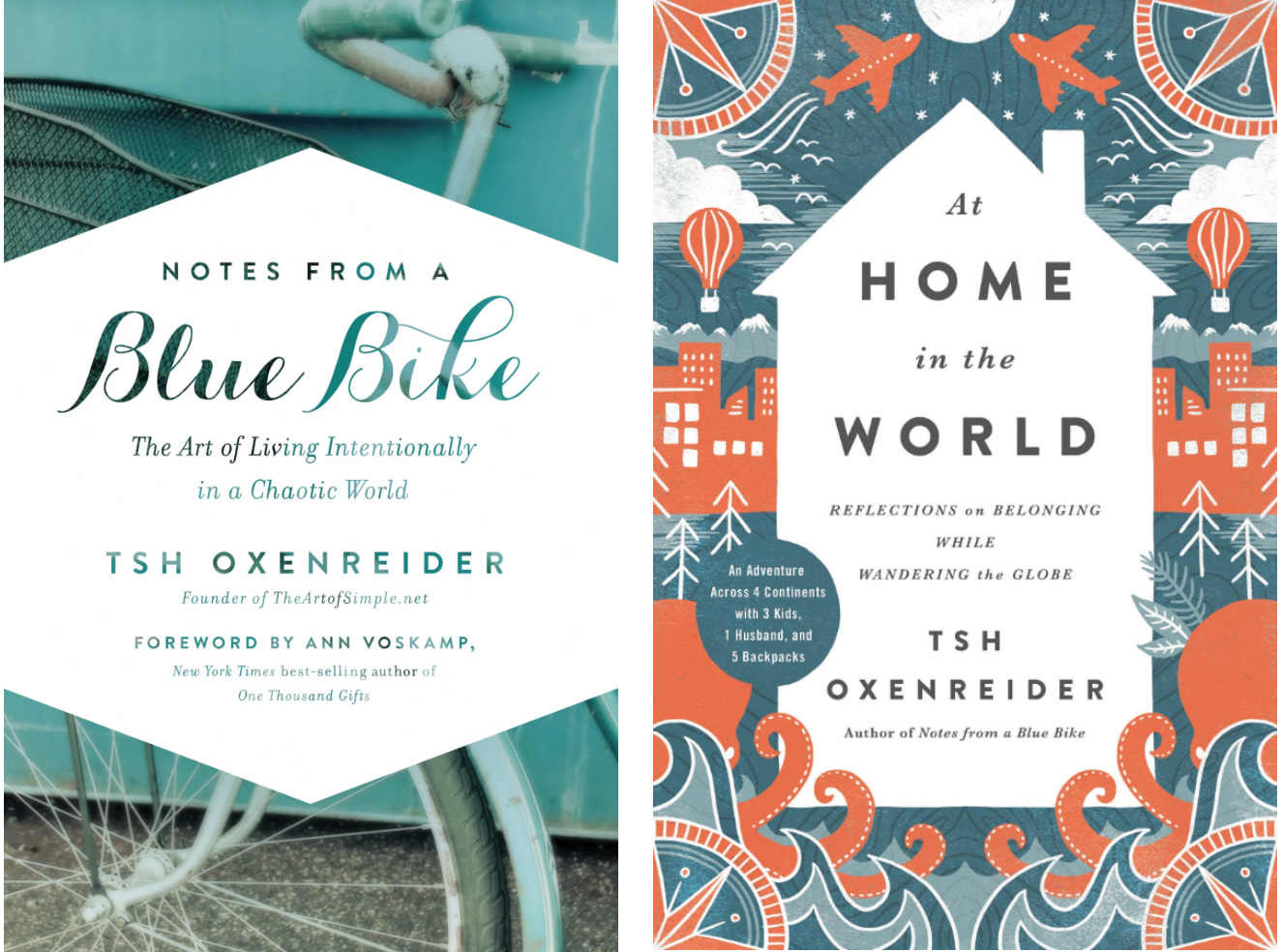
You’ve authored several books over the years. How is writing like travel?
Both are journeys, and if done well, both don’t leave you the same person as you were when you first began. I usually say that I needed to have become the person who wrote that particular book more than that particular book needed to have been written. There are so many new books published every year, and I’d wager that 99 percent of them never needed to be published. A smart reader can just tell when a book is published either because the writer wanted to write a book or because the publisher wanted to make money, not because the book was good and necessary and had the reader in mind.
“If the process of wrestling with the ideas and words that end up on a printed page doesn’t form me into a better person, then I’d argue whether I needed to write that book in the first place.”
—Tsh Oxenreider
What’s your favorite part of a writing project?
I love getting to wrestle with ideas and stories and letting them have their way with me, and then sharing the finished result with a reader and trusting that those words will have their way with them, too. I’m an introvert, so writing is often an invitation to live in my head and get to interact with ideas instead of people—but that’s not a good thing if it stays there. Publishing words, however, invites other people into the conversation. That’s the difference between a private journal entry that’ll forever live only in my journal and something that’s out there for the world to read.
Least favorite?
Writing is just so dadgum hard. It is really, really hard to have this picture in your head of what it is you're trying to say and to stare into the chasm between that and what your convoluted attempt that’s coming out from the cursor is actually saying. It’s the Ira Glass gap. I don’t think it ever goes away.

Final question: You can invite any three authors for a lengthy meal. Neither time period nor language is an obstacle. Who do you pick, why, and how does the conversation go?
I both love and hate this question because it’s so open-ended! I’ll ignore the pressure I feel to make this my be-all, end-all answer and just go with what I’d answer today: I'll invite J.R.R. Tolkien, Charles Dickens, and John Steinbeck because they’re all writers’ writers and each had such interesting habits and processes that led to the creation of their best works.
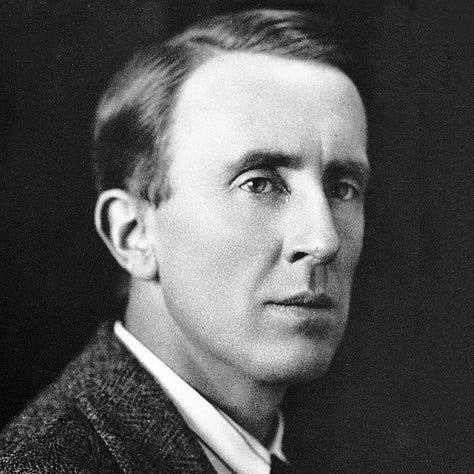
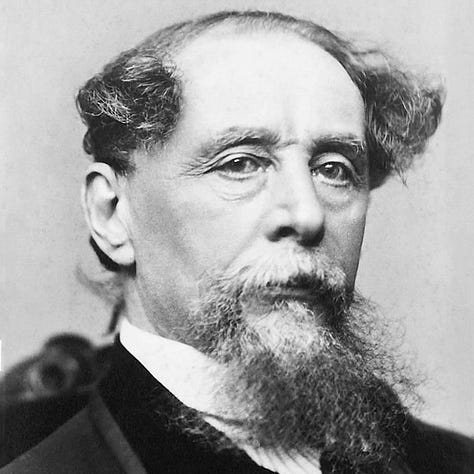
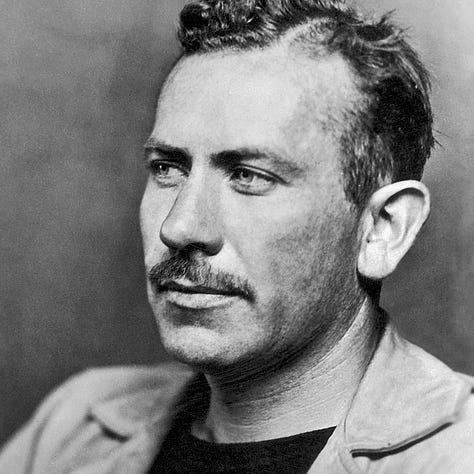
I’d love to pick their brain about how they developed ideas, their opinions on the essentials of any good story, and when to know it’s time to stop fiddling and call a story good enough. They all three wrote excellent characters and built fascinating worlds (even though they’re wildly different from each other), so I’d ask them how they came up with what they did. And I suspect they’d each be interesting dinner companions—quirky as heck with weirdly astute observations about each other. That could be fun.
Thanks for reading! If you enjoyed this post, please hit the ❤️ below and share it with your friends.
Not a subscriber? Take a moment and sign up. It’s free for now, and I’ll send you my top-fifteen quotes about books and reading. Thanks again!
Related post:

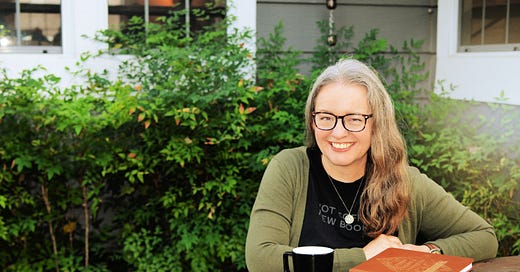




Loved waking up to this surprise! Lovely to get deeper insights into Tsh's writing and teaching - I resonate a lot with her perspectives and teaching approach. Tsh, if you are reading this, you absolutely should plan a pilgrimage on the Camino de Santiago for 2025! I walked over 300km twenty years ago, and it changed me profoundly; there is a sacredness about it that I could sense even without being a Christian at the time. Also, save me a seat at that dinner table with my favorite authors :)
Tsh was one of the first bloggers I followed yeeeears ago. I think I read Blue Bike three times. And her book Living Simply. And she wrote about my family in At Home In the World. We spent 5 weeks in Cambodia, then moved there for 5 years. Tsh, if you’re reading this, HI!!! 🩵🩵🩵